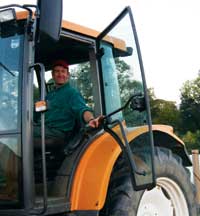Farmer Focus Livestock: Grass growth is slow for Tim Downes

It is Nuffield conference time again and Louise and I are looking forward to stimulating papers and listening to the scholars responding to challenging questions.
On farm, all our drilling has gone in to dry soils. But now the weather is changing, wheat is beginning to germinate. We are using some high seed rates of more than 100kg/acre with triticale to counter lower tillering and competition from docks. The oats are up and away drilled at 70kg/acre awaiting the weeder harrow soon if conditions allow.
We have sourced some local organic potatoes as our rationing showed a shortage of lysine. The ration is wholly Shropshire derived which I’m pleased about and is surely helping our carbon footprint. The winter diet will consist of red clover silage and pea and barley wholecrop with rolled wheat, oats and peas fed through the parlour.
I was given a co-ordination test recently wrapping chopped silage bales. A few bales made an early exit before six layers were applied and I was glad when Tony returned to skillfully clear up the stragglers in the dark. With grass growth slow it is reassuring to have dry bales and turnips to graze within the next few weeks.
Herdsman Andy hosted the Starstaff meeting discussing the chicory-dominated ley that was being taken down to the ground by the dairy herd. The dry autumn has certainly favoured this deep rooting species and the cows soon got the taste for it.
A recent discussion by the Stargrazers group on energy saving devices was useful, as we are in the midst of submitting an application to install solar and heat recovery systems into the dairy.
The Duck Race down the Cound Brook was a success with wet children and some fast plastic ducks, but a very cold mug that had to rescue the wandering racers.
More columns from Tim Downes
More information from other Livestock Farmer Focus writers
